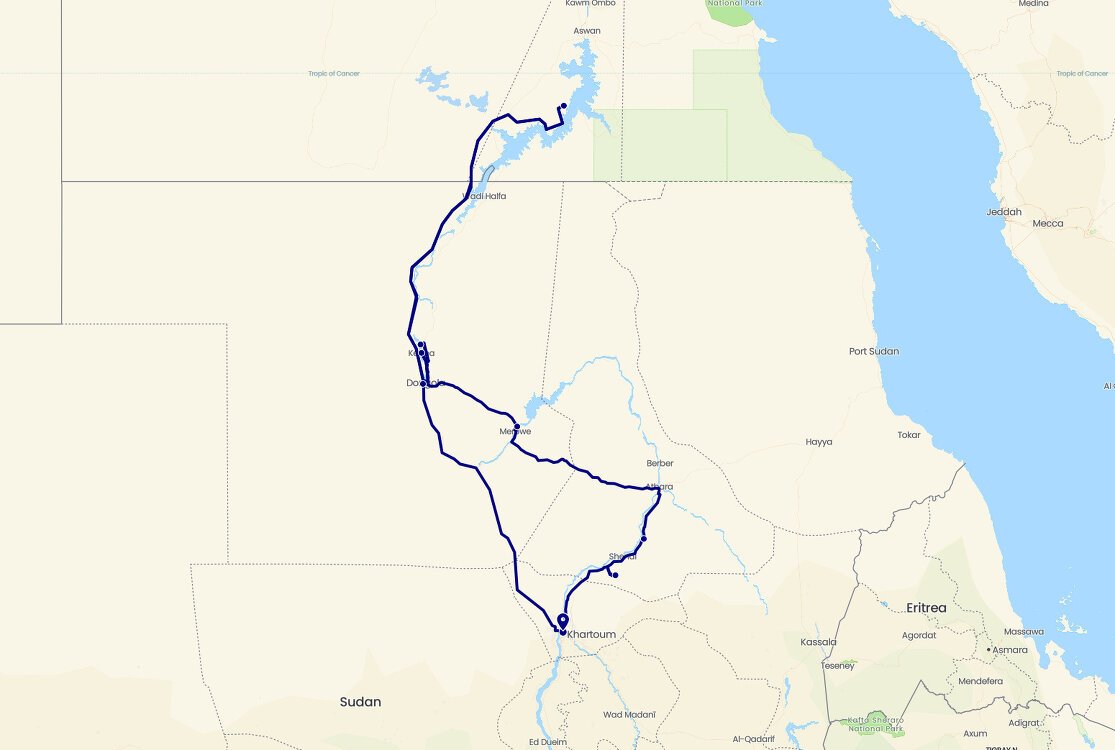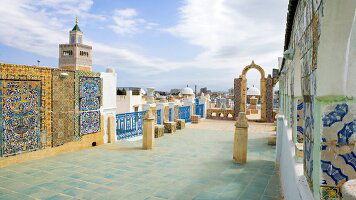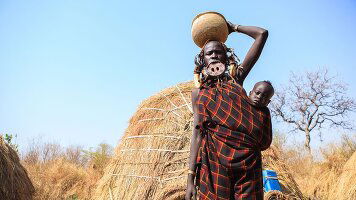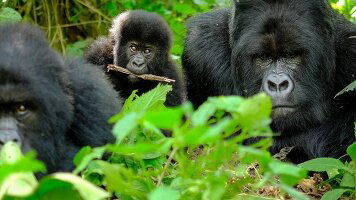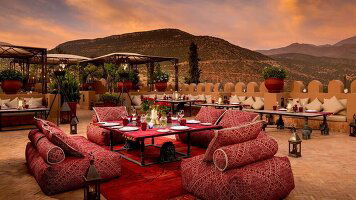Overview
The stunning rugged terrain of Sudan is home to some of the most romantic archaeological sites in the world, among them several whole fields of pyramids. Join us as we discover one of the worlds oldest civilisations, brimming with history and sites that you never dreamed existed.
12 Days
Khartoum
Khartoum
Cultural Immersion
4 - 4.5 Star
Premium
18-99 Years
12
Easy
Fully Guided, Locally Guided
CCAN
Itinerary
Welcome to Sudan! Upon arrival in Khartoum, you will be met at the airport and transferred to your hotel. The remainder of the day is yours at leisure.
Built where the Blue and White Nile rivers meet, Khartoum is a boisterous, modern, flashy city with an ever-increasing number of glass tower blocks altering its skyline. As well as an excellent museum, some fascinating souqs and Nile-side views, Khartoum's good facilities, hospitable people and laid-back vibe provide the traveller with a warm welcome to this fascinating country. Stay: Grand Holiday Villa Hotel or similar
Enjoy breakfast at your hotel. This morning, start your Khartoum city tour. Cross the confluence between the Blue and the White Nile near the Presidential Palace where in 1885 General Gordon was beheaded by the Mahdi's troops and reach Omdurman, the old capital of Sudan. Here you will see Mahdi's Tomb from outside. Visit the interesting Khalifa's House which holds a small museum about the Mahdyia. You then visit the colourful souk of Omdurman. Take a pleasant boat ride on the Nile to see the confluence between the Blue and the White Nile.
Lunch today is in a local restaurant in Khartoum. In the afternoon, visit the National Museum that besides many beautiful objects, contains two beautiful temples rescued by UNESCO and moved from the Lake Nasser area, when it was flooded by the water.
Before sunset, move to Khartoum North to see the traditional Nubia Wrestling. Return to your hotel. Stay: Grand Holiday Villa Hotel or similar (B/L)
This morning you will drive north to cross the Western Desert on a good tar road until you reach the Nile that you will cross in to Ed Debba. Continue by road along the Nile to visit the site of Old Dongola, the old Christian capital of the Makuria Kingdom.
Old Dongola is a deserted town located on the east bank of the Nile. An important city in medieval Nubia, and the departure point for caravans west to Darfur and Kordofan, from the fourth to the fourteenth century, Old Dongola was the capital of the Makurian state. A Polish archaeological team has been excavating the town since 1964. Stay: Camping (B/L/D)
After breakfast, it is time to depart and transfer to the central part of the Nubian region where you will have the chance to experience some Nubian Villages. Here the population lives in small villages amongst yellow sand dunes and palm trees. They speak a different language from the Arabs and also the Islamic religion is not as “strict” as in other regions. The women don't cover their faces and will readily speak to foreigners. Look out for the houses in these villages that are painted and decorated with colourful patterns and flowers. Enthusiastic hospitality abounds, people will often invite travellers to visit their home and share a meal or a cup of spiced tea.
Then you will begin the drive to Kerma and visit the majestic “Defuffa” and the rest of this ancient civilisation. There will be time to pay a visit to the Kerma Museum, founded by Charles Bonnet, where you will see the seven beautiful statues of the Black Pharaohs discovered by a Swiss archaeological mission in 2003.
Late in the afternoon, you will reach Tombos. Stay: Preset Camp in Tombos or similar (B/L/D)
After breakfast, depart for Wadi Sebu, located on the river bank of the Nile. You will pay a visit to one of the richest sites of rock engraving in all of Sudan with hundreds of images from prehistoric to Egyptian times.
Then it is onward to the granite boulders of the Third Cataract, this site used to be the third huge obstacle that the ancients Egyptians had to face when trying to sail on the Nile River. The Third Cataract presents very interesting rocky formations. It is located north of Kerma, the ancient capital of the Kingdom of Kush, which lasted for over 1,000 years before falling under the control of the Egyptians thanks to the natural protection offered by the cataract itself. When the 18th New Kingdom dynasty reached it, made here the border between the Egyptian Empire and the Nubian kingdom.
After a picnic lunch, you will reach the Nile and cross it via the pontoon, the local ferry boat. These ferries are a hive of colourful activities. You will find yourself sharing space with people, donkeys, camels and goats. Late in the afternoon, reach Soleb where you will visit the Temple of Soleb, the most beautiful Egyptian temple of all Sudan. Testimony of the New Kingdom in Nubia is the many walls rich in hieroglyphic inscriptions, bas-relief figures and ornate columns. Return to Tombos. Stay: Preset Camp in Tombos or similar (B/L/D)
This morning, pay a visit to ancient granite quarry site of Tombos. You will see a statue of the King Taharqa, simply left there in the desert 3,000 years ago. On the Nile banks, see some Egyptian stelae and inscriptions. This was the southern border of the ancient Egyptian kingdom for centuries. Cross the Nubian Desert to reach the village of El Kurru where there is one of the necropolises of the ancient capital, Napata. You will visit one of the tombs, which is excavated in the rock under pyramids.
Although partially collapsed you can still see the decorated images of the Pharaoh, gods and multicolour hieroglyphic inscriptions. Not far from here there is an interesting site of petrified wood, an ancient forest with hundreds of huge trunks.
This evening, enjoy sunset at Jebel Barkal, enjoy watching the end of the day over this amazing landscape. Stay: Karima Nubian Rest House or similar (B/L/D)
After breakfast, it is time to get up close and learn more about Jebel Barkal. A key landmark in the Nubian Desert, Jebel Barkal, which means mountain in Arabic, can be seen from miles around. At the foot of this wonderful and isolated red sandstone mountain, considered holy since the ancient times, there is a big temple, dedicated to the Pharaohs of the New Reign and to their patron, Amon. Amon's ancient “Pure Mountain”, the Olympus of the Nubians, was the religious Nubian heart for more than 1,000 years. Besides the ruins of the big temple there are several sculptured granite rams that were once a border along an avenue that probably led to the pier on the Nile. In the mountain wall, there is a vast room decorated with bas-relief. You will soon see why Jebel Barkal archaeological sites are on the World Heritage list. Lunch today will be at the Nubian Rest House in Karima.
Take a boat ride on the Nile for a late afternoon visit to the Pyramids of Nuri. More than 20 ancient pyramids belonging to Nubian kings and queens are still standing at Nuri, which served as a royal necropolis for the ancient city of Napata, the first capital of the Nubian Kingdom of Kush. It is probable that, at its apex, 80 or more pyramids stood at Nuri, marking the tombs of royals. Stay: Karima Nubian Rest House or similar (B/L/D)
After breakfast, it is time to start your journey crossing the Nile. Enter the Bayuda Desert, an area bounded by the loop formed by the Nile between the Fourth and Sixth Cataract. The region is characterised by volcanic cone shaped black basalt mountains. They alternate with level pebble stretches and large valleys crossed by dry wadis, where little vegetation can be seen. Look out for isolated groups of Bisharin nomads, who live in family groups in small huts made of intertwined branches.
In the centre of the Bayuda Desert reach Atrun Crater. Local nomads gather salt from the edge of a green coloured pool, in turn they will then sell it to markets of the towns outside the desert. Continue your desert crossing visiting wells where nomads gather water for their camels and goats. Stay: camping (B/L/D)
Today you will finish crossing the Bayuda desert and again cross the Nile on a local ferry boat. As you drive along the other side of the Nile catch a glance of more than 40 pyramids located on top of a hill, some of them perfectly preserved that belong to the Royal Necropolis of Meroe. Stay: Meroe Camp or similar (B/L/D)
This morning is dedicated to visiting the Meroe pyramids. The Royal Necropolis of Meroe which is located about 3 km from the Nile on some hills covered by yellow sand dunes. Several pyramids stand out with their sharp shapes against the clear sky. Each one has its own funerary chapel with the walls fully decorated with bas-reliefs that show the King's life and offers to the gods. Visit the Tarabil school (if open), that we support as part of our responsible tourism policy.
Coffee break at the local village of Kabushia. In the afternoon, move along the Nile to visit the ruins of the Royal City. Sunset today will be at the Pyramids. Stay: Meroe Camp or similar (B/L/D)
Following breakfast at the camp, you will begin the journey southward. The site of Mussawarat is located in a beautiful valley crowned by hills. Here the ruins of a very big temple are visible; it once played an exceptional important role. Its main characteristic, the “Great Enclosure” is made by many constructions and boundary walls which surround a temple built in the 1st century A.D.
Then it is time for a visit to Naga which is one of two centres that developed during the Meroitic period. In Naga, in a typical Saharan environment with rocks and sand, you will find a 1st Century AD temple dedicated to Apedemak. Marvel at this wonderful building with bas-relief decorations depicting the god with a lion's head, the Pharaoh, noblemen and several ritual images. A few metres away there is a small and odd construction with arches and columns, named “kiosk”, in which you will notice Egyptian, Roman and Greek styles, all at the same time. Visit another temple dedicated to Amon with many statues of rams and beautiful gates decorated with bas-reliefs.
In the late afternoon, you will arrive in Omdurman where we see the Dervish ceremony in Ahmed al Nil cemetery.
After sunset, you will reach Khartoum where you will be dropped off at your hotel. Stay: Grand Holiday Villa Hotel or similar (B/L)
The day is yours at leisure until it is time to be transferred to the airport for your onward flight. (B)
Trip Inclusions
- Witness traditional Nubian wrestling
- Camp in the Nubian Desert
- Travel on the local pontoon boat with locals, goats and camels to cross the Nile
- Visit the Temple of Soleb rich in hieroglyphic inscriptions
- Witness nomads collecting salt in the Bayuda Desert
- Explore more than 40 pyramids that belong to the Royal Necropolis of Meroe
- Experience a Dervish ceremony in Ahmed al Nil cemetery
- Return airport transfers
- 11 nights accommodation
- Meals as per the itinerary
- Services of an English speaking local guide
- Transportation in an air conditioned vehicle
- All the camping equipment and the cook in charge of the meals (excl sleeping bags, pillows and sleeping mats)
- Entrance fees as per the itinerary
- Permits and local taxes
- National Museum and archaeological sites entry fees
- Photo permit
- Passport registration
- International and Domestic flights
- Drinks unless otherwise mentioned
- Visas
- Travel Insurance
- Tips
- Inoculations
- Items of a personal nature
- Anything not mentioned in the itinerary
- Accommodation, itinerary and inclusions subject to change.
- Disruptions to itinerary may occur.
Operator
Known for our in-depth more knowledge of our destinations we distinguish ourselves by offering exceptional, off-the-beaten-path experiences, intimate group sizes (max 12), personalised service, and a deep commitment to creating extraordinary memories. If you're an adventurous but polished traveller seeking unique and transformative experiences, Crooked Compass is for you.
Prices & Dates
There are currently no departures available on this trip. Either it's the end of the season and new departures will be released shortly, or this itinerary has been changed and is not operating this season. Feel free to contact us for information about when next seasons dates will be released or click here to view general release dates for all destinations.
Tour & cruises prices are per person. Prices shown have savings applied, are subject to availability and may be withdrawn at any time without notice. Pricing and trip details are correct at this point in time, however are subject to confirmation at the time of booking and are subject to change by Crooked Compass. For cruise itineraries, cabin images are sourced from the cruise-line and should be treated as indicative only. Cabin inclusions, upholsteries and room layout may differ to the image(s) shown depending on the ship selected and your sailing dates.



